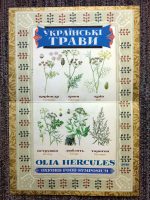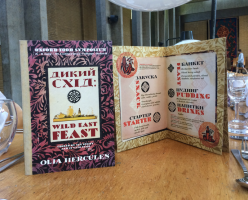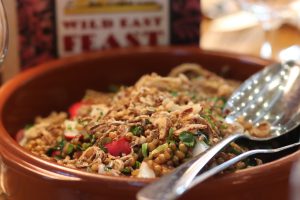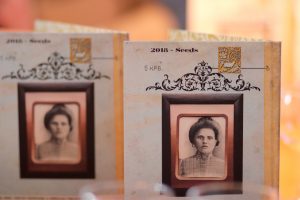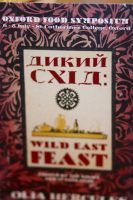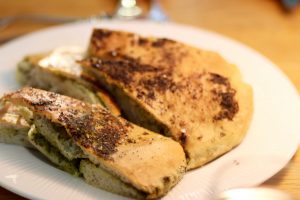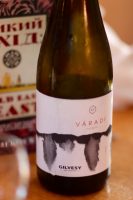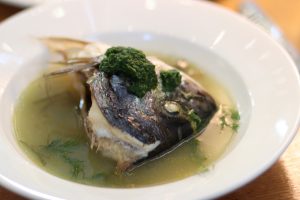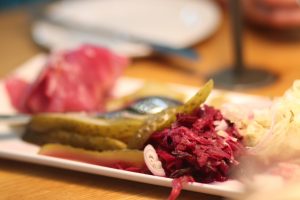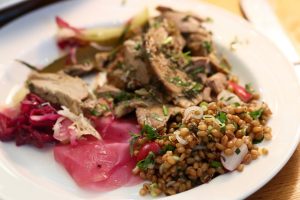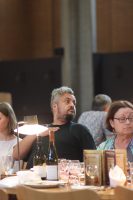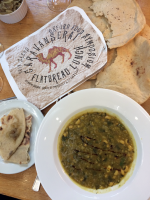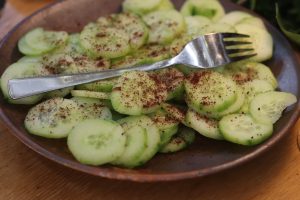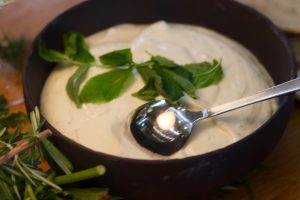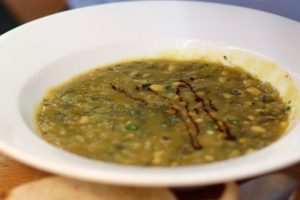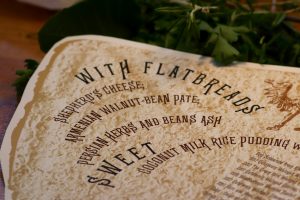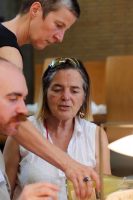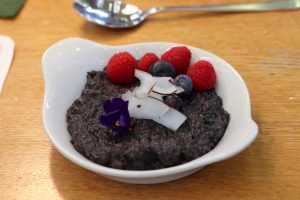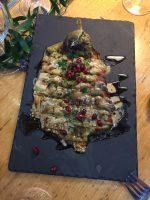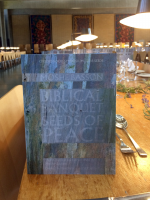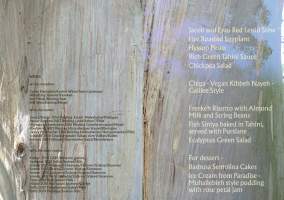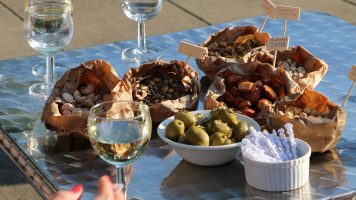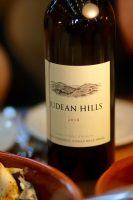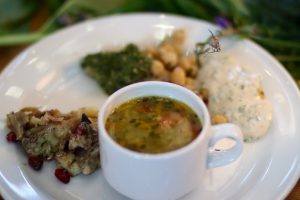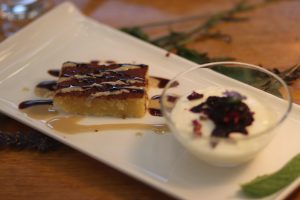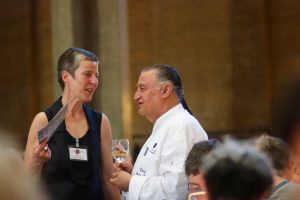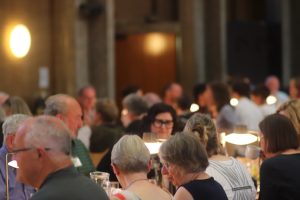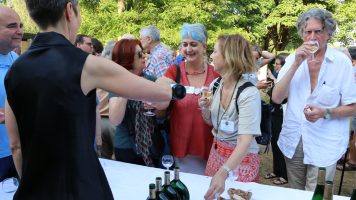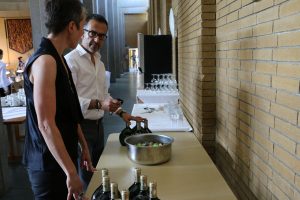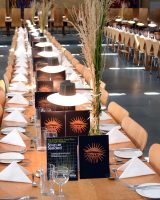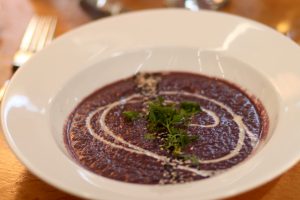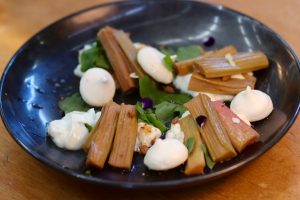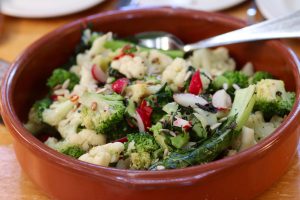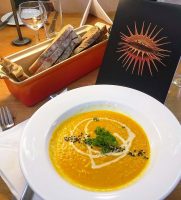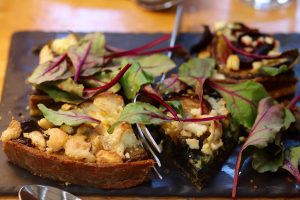
Report by Voltaire Cang
A devoted Symposiast, now a good friend, once told me that his joining the Oxford Food Symposium was a gift he gave himself each year. Indeed, the Symposium is a gift, one consisting of time well-spent in the company of students and academics, writers, chefs, food producers, media and business professionals, scientists, and general food enthusiasts – which is just about everybody. It is also a gift that keeps on giving during and beyond the Symposium’s three days, through thought-provoking lectures and research presentations, well-planned and utterly delicious mealtimes and receptions, sidebar (and “barside”) events and informal discussions, book sales and signings, and, most importantly, new and renewed friendships.
This year’s Symposium started before it formally began, with an excursion to the Oxford Botanic Garden by Symposiasts who arrived before registration and braved the midday heat with the Garden’s Director, Dr Simon Hiscock. (A good number of early comers preferred to stay indoors and join a marathon Wikipedia editing session.) Dr Hiscock was to be the afternoon’s plenary speaker, in which he reminded us how all life on Earth depended on plants and, thus, on seeds, that he called “boxes with baby plants inside.” His lecture was followed by Dr Elinor Breman of the Millennium Seed Bank in the Royal Botanic Gardens at Kew, one of the largest centers for seed conservation in the world.

Dr. Breman complemented the first lecture with her message about the critical importance of seeds for feeding the world’s exploding population as she also introduced her organization’s work in storing seeds that in some cases could be dried and frozen for centuries. After the plenary came the afternoon reception with sparkling wines from Schloß Vaux in the renowned Rheingau region that segued into dinner, an herbaceous, Eastern European “Wild East Feast” by Olia Hercules whose menu included the gift of a full fish head in each diner’s soup starter. Hungarian wines from Robert Gilvesy and Zoltan Heimann (who were both personally present to introduce us to them) and a gorgeous sweet Tokaji from Balassa accompagnied them beautifully.
After dinner, a good number headed to “The Jewels of Life,” a seed and plant jewelry exhibit-cum-atelier with artists Gönül Paksoy and Lalehan Uysal, where visitors were invited to create personal fashion accessories using the seeds on display. Many appeared unwilling for the day to end: discussion groups mingled around the bar, in obeisance to the trustees’ exhortation at the afternoon’s welcome session to “talk to everybody, since the Symposium is for everybody, an all-inclusive gathering of people with common interests.”
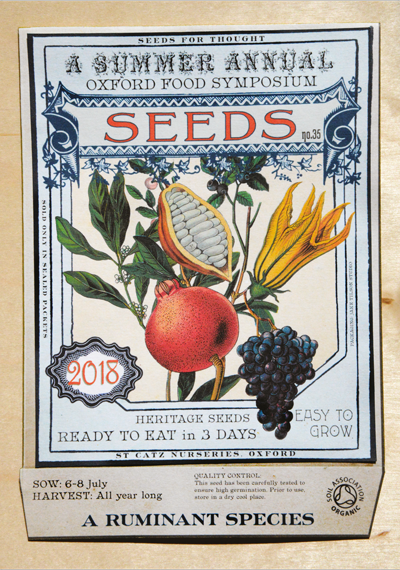
Plenary sessions
Keynotes
Åsmund Asdal
Assaf Distelfeld
Stephen Jones
Simon Hiscock
Elinor Breman
OFS Rising Scholar
Molly MacVeagh
OFS Young Chefs
Elena Müller, Maria Nehmes, Ian P. Cairns, Karan Upmanyu
Events
Oxford Botanic Garden tour: Plants that Changed the World
Led by Dr Simon Hiscock, Director, Oxford Botanic Garden and escorted by Jeremy MacClancy.
Wiki edit-a-thon
Roberta Wedge
Meals & Receptions
Friday dinner
Wild East Feast by Olia Hercules
Welcome reception – with nibbles from Olia Hercules and wines from Christoph Graf, Schloß Vaux, Rheingau/Germany.
Menu – Rye Borodinsky bread, salo, vodka, pickle. Sourdough, Georgian mint adjika, curd cheese, peaches. Fish head broth, millet, dill and garlic lyok. Herbacious lamb. Wheat berry salad. Fermented pickles, sliced shallots, sunflower oil. Buckwheat ice cream + British cherries.
Drinks – Hungarian wines from Robert Gilvesy/Badacsony, Zoltán Heimann/Szekszárd, and Balassa/Toka.
Saturday Lunch
Caravanserai Flatbreads
Devised by – Naomi Duguid in collaboration with Chef Tim Kelsey and the St Catz staff
With flatbreads – Shepherd’s cheese; Armenian walnut-bean pate; Persian herbs and beans ash. Coconut milk rice pudding with berries. Served with a selection of Scheurebe wines from Rheinhessen/Germany;
and dessert libation: Daigo no Shizuku from Terada Honke/Japan.
Saturday Dinner
Biblical Banquet Seeds of Peace
Devised by – Chef Moshe Basson, The Eucalyptus /Jerusalem
Drinks reception – with Gefen Hashalom: Kosher Silvaner from Wirsching/Franken and Kosher Riesling from von Hövel and Nik Weis/Saar, Germany and book signing presenting Reaktion Books authors Helen Saberi, Laura Mason, & Bruce Kraig
Menu – Jacob and Esau Red Lentil Stew. Fire Roasted Eggplant. Hyssop Pesto. Rich Green Tahini Sauce. Chickpea Salad. Chiga – Vegan Kibbeh Nayeh – Galilee Style. Freekeh Risotto with Almond Milk and String Beans. Fish Siniya baked in Tahini, served with Purslane. Ecalyptus Green Salad. For dessert – Basbusa Semolina Cakes. Ice Cream from Paradise – Muhallebieh style pudding with rose petal jam.
Drinks – Wines from the Twin Wineries, Germany/Israel
Sunday Lunch
Soup-er Seeded
Devised by – Abi Aspen Glencross & Sadhbh Moore in collaboration with David Matchett / Borough Market
Menu – Apiaceae & pedaliaceae soup: Carrot, cumin, coriander & sesame seed soup. Graminae sourdough – A variety of breads made from rye, spelt, wheat, corn, barley, einkorn. Amarathaceae jumble – beetroot, rainbow chard, spinach, quinoa, goats cheese. Brassica and asteraceae olio. Polygoneaceae medley – spiced poached rhubarb, sheep’s milk custard, sorrel meringue, toasted buckwheat crumb.
Drinks – Wine from Weingut Bernhard Ott, Wagram, Austria
After dinner events
The Jewels of Life:
A Seed Atelier with designer Gönül Paksoy and photographer Lalehan Uysal.
Seeds: Commons or Corporate Property?
A film
The Sifter
Informal chats with Barbara Ketcham Wheaton about The Sifter.
Parallel Sessions & Papers


